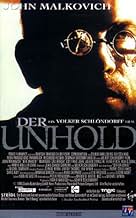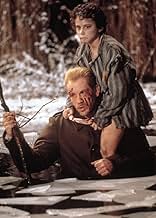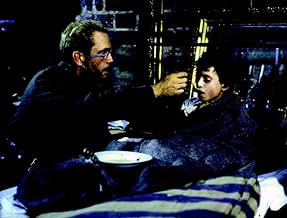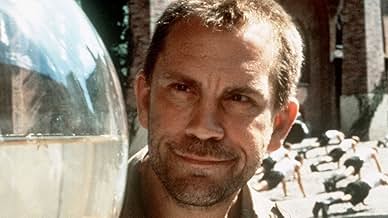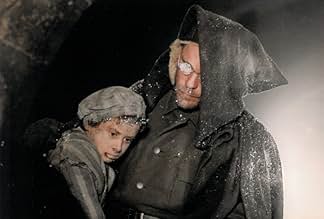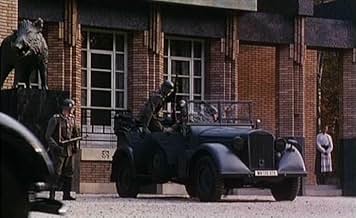Frenchman Abel Tiffauges likes children, and wants to protect them against the grown-ups. Falsely suspected as child molester, he's recruited as a soldier in the 2nd World War, but very soon... Read allFrenchman Abel Tiffauges likes children, and wants to protect them against the grown-ups. Falsely suspected as child molester, he's recruited as a soldier in the 2nd World War, but very soon he is taken prisoner of war. After shortly serving in Goerings hunting lodge, he becomes ... Read allFrenchman Abel Tiffauges likes children, and wants to protect them against the grown-ups. Falsely suspected as child molester, he's recruited as a soldier in the 2nd World War, but very soon he is taken prisoner of war. After shortly serving in Goerings hunting lodge, he becomes the dogsbody in Kaltenborn Castle, an elite training camp for German boys. Completely happ... Read all
- Director
- Writers
- Stars
- Awards
- 1 win & 1 nomination total
- Director
- Writers
- All cast & crew
- Production, box office & more at IMDbPro
Featured reviews
During Hitler's Putsch in 1923, Goring sustained a painful injury whose relief by means of morphine turned him into a drug addict nearly the rest of his life. This influence, in turn, made him "alternately elated or depressed; he was egocentric and bombastic, delighting in flamboyant clothes and uniforms, decorations, and exhibitionist jewelry." We see all these traits in Spengler's scenes, e.g. in his drunken alternation between a tirade and a blue funk at the fact that someone else had shot a stag that he wanted to shoot. When a soldier enters to bring him some really bad news, Goring is already so gloomy that he barely raises his hand from the table to salute, and his "Heil Hitler" is just a slurred grunt.
The article also establishes his corpulence and luxuriousness, to a point resented by his colleagues in the party. "His hunting interests enabled him to obtain a vast forest estate in the Schorfheide, north of Berlin, where from 1933 he developed a great baronial establishment" called Carinhall, full of artistic war booty, to which he retired whenever he could.
The film showed Goring as an often jovial man given, like Hitler, to occasional fits of imperious screaming. This behavior, according to one book I read recently, was to be expected of any top leader of the Third Reich not merely as a habit but as a deliberate technique. People outside of Germany were slow to take Hitler seriously as a threat because this conduct was so strange to them. They did not realize that German culture of the time regarded it as a standard part of the fatherly role. Therefore, as Hitler understood well, the more he screamed and shouted at his countrymen, the more closely they would identify him as a father figure and the embodiment of Der Vaterland.
Many superstitious beliefs have been associated with precious stones. The novel explains that Goring was not unique in imagining that plunging his fingers into a bowl of gems would drain away nervous energy and uncomfortable emotions. Other sources recount that when Hugo von Hofmannsthal's first poems appeared, under a pseudonym, they were so heavy with sensuous Weltschmerz that one critic declared they must have been written by an opulent old man while dipping his fingers in jewels. (He would soon be surprised that the poet was still a youth). So even this strange indulgence of Goring is in keeping with the ambient culture among those few who could afford the experience.
One could say much, much more about this complex film, but perhaps this elucidation of just one minor aspect suggests the multilayered care with which it has been put together.
This is the story of Abel, an affable simpleton from France with a love of children and animals (no, there are no undertones of pedophilia). Prior to WWII, he is wrongly accused and convicted of child molestation. While working in the work camps, he is captured by the Germans and through a series of events ends up as a prisoner of war worker in a training school for Hitler youth. He is emotionally seduced by the romantic notions of Hitler's national socialism and the great devotion to the fatherland that is being taught there. And of course, he loves working with the boys. The Germans notice this and how much the boys like him as well, so they ask him to recruit more boys for the school from the local countryside. Things go along well until the Russians invade and the only defense of the school must be made by the students (who are well trained in the art of war).
This is a terrific story that gives us a more realistic look inside Germany during the war. No, it wasn't an idyllic free society. But it wasn't exactly a factory for mechanized inhuman killers as it has been routinely portrayed either. We come to understand that what we considered evil was being presented to the children in terms that seemed good and noble. They felt as if they were on an idealistic quest, not on a diabolical mission of subjugation.
The direction of this film was expertly done. Volker Schlondorff's presentation of the story, though slow moving at times, offered an excellent character study of Abel and was patient in proffering revealing looks at the people and the feelings of those around him.
Malkovich is fantastic as the naïve and slow witted Abel. He is wonderfully childlike and sincere in his portrayal; reminiscent of his role in Of Mice and Men'. This is the best I can remember him in quite some time.
This is a poignant and compelling film of substance. I rate it a 9/10. The sophisticated viewer will enjoy it.
The movie is spanning a few years of time and the rhythm is slow, as one would expect from a film made from a book, and, while a little boring and depressing, it is a nice movie.
Bottom line: imagine Forrest Gump in Europe. No humour, no hope, no cares in the world. Oh, except the war. ;)
Did you know
- TriviaGerard Depardieu was slated for the lead role
- GoofsPrior to the school fire, a caption says "Paris 1925". Upon his arrest as an adult, Abel, through his narration, remembers the fire as having happened "twenty years ago". This would place his adult scenes in 1945, but when he joins the French army after his arrest it is before the German occupation of Paris which would place his arrest in 1940. However, Abel is slow-witted and possibly does not have an accurate sense of time.
- Quotes
Count von Kaltenborn: This whole beautiful country, to which we have given our souls, is utterly doomed. It's going to be wiped out of human memory. Our entire heritage, even our name, our ancestors' names, wiped out, all wiped out!
- ConnectionsFeatured in Hollywood Profile: John Malkovich (1998)
- How long is The Ogre?Powered by Alexa
Details
- Release date
- Countries of origin
- Languages
- Also known as
- The Ogre
- Filming locations
- Production companies
- See more company credits at IMDbPro
Box office
- Gross US & Canada
- $50,935
- Gross worldwide
- $50,935
- Runtime1 hour 58 minutes
- Color
- Sound mix
- Aspect ratio
- 1.85 : 1
Contribute to this page


